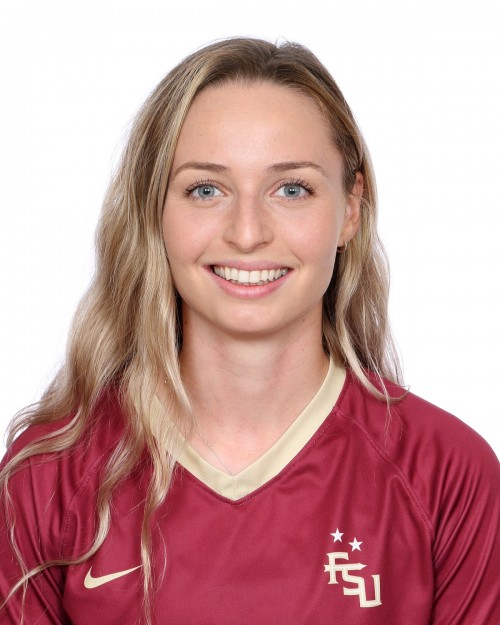
Statistics don’t tell the whole story of Dartmouth’s Myra Sack
Angie Hind knows a good soccer player when she sees one.
She played at the game’s top level in her native Scotland, spending 17 years with FC Kilmarnock and three years with the Scottish national team. She also has an A-level coaching license from the Scottish Football Association and was a coach in the national team program for five years before coming to the U.S. to join the coaching staff at Dartmouth College.
But one thing has bothered Hind, who’s now in her fifth season as the Big Green’s head women’s coach after two years as an assistant, in her time on this side of the Atlantic. “I feel like sports are dominated a lot by statistics here,” she said, “and soccer’s not a sport that fits easily into that.”
Myra Sack is a prime example of Hind’s point. The Dartmouth midfielder has modest statistics - four goals and 12 assists in 58 games (54 starts) - but there’s little doubt that the senior from Wynnewood, Penn., has had an outstanding career.
“When you look at the stats, you look at the goals and the assists, she’s certainly not going to blow you away by any manner or means. But she is just the kid that just makes it happen,” Hind said of Sack, who was an All-Ivy League selection last season after earning honorable mention status the previous two years.
“She’s the kid that enables us to get the ball and keep the ball, or she plays the pass before the assist, or she’s the kid that breaks up things ... She’s just fundamental to our team. I just feel there’s so many midfield players that don’t get the recognition because they don’t score goals and they don’t make assists regularly, and it’s an absolute shame. I know our program wouldn’t be what it is without her.”
There are other programs beyond Hind’s that can say the same thing.
And in those areas, there are impressive stats: Most notably, the more than 200 children in the Upper Valley area around Dartmouth, located in Hanover, N.H., and the more than 100 young girls in Granada, Nicaragua, who have benefitted from Sack’s quest to help others have the athletic opportunities she had growing up near Philadelphia.
“I realized once I was here that so much of who I am and what I know is sports and all the opportunities that its given me,” Sack said.
Efforts such as these on and off the field, along with carrying a 3.61 grade-point average in government (with an emphasis on Latin America) at one of the country’s top universities, explain why Sack is one of 10 finalists for the Lowe’s Senior CLASS Award for women’s soccer. The award recognizes a senior student-athlete for achievements in four areas - classroom, character, community and competition.
“It’s a little bit overwhelming to be in that category with all those incredible other student-athletes,” said Sack, who spent some time looking through the impressive resumes of her fellow finalists. “It’s a huge deal.”
And though she’s humble about it, Sack is a pretty big deal, too.
It all can be traced back to a speech by Paul Farmer, a world-renowned global health expert, during Sack’s sophomore year at Dartmouth. “(He) gave this really inspiring speech that fall,” she recalled. “And I sat there and listened. He said, ‘I’m sure all you guys want to try to change the world, but there are so many things to be done right here.’ “
That November, Sack was back home for Thanksgiving along with teammate Becky Poskin, and the two hatched the idea for Athletes United. The organization offers free sports leagues for fourth-, fifth- and sixth-graders in the Upper Valley, with Dartmouth student-athletes as coaches. The first Athletes United program was held in the summer of 2008; this fall, the group is running basketball programs in eight area communities - soccer is the sport of choice in the spring, and there’s also a summer session.
Basketball holds a special spot in Sack’s heart, too: She played the sport at Lower Merion High School - the same school NBA star Kobe Bryant attended - and is a volunteer assistant coach for an AAU team in the Philadelphia area. Sack said she might have tried playing in college if she had grown taller than her current 5-foot-5 frame.
“The goal was to have Dartmouth students go out and have these other communities come in, to start bridging that gap between Dartmouth and communities in the Upper Valley,” said Sack, who was thrilled to have 65 student-athletes come to the first meeting of this fall’s session for Athletes United.
Sack said that Big Green athletes go to their respective communities one or two nights per week, as their schedules allow. Then on the weekends, the kids from those programs come to Hanover, where they play and practice at Leede Arena, the home of Dartmouth’s basketball team. There has been steady growth in participation in Athletes United each of the first five sessions.
“It’s getting there,” said Sack, who, along with Poskin, received the annual Dartmouth Class of 1950 Award last spring recognizing student-athletes with extraordinary commitment to community service. “We just got some funding, which is huge. The first year and a half ... we did it with no money, just because the athletic department was so helpful in getting us facilities and equipment - a few things came out of pocket. But we just got an alumni donation, so that’s going to be huge for us.”
Sack’s influence reaches well beyond the Upper Valley - all the way to Nicaragua, thanks to her work with Soccer Without Borders.
The group, created by former Lehigh men’s soccer player Ben Gucciardi in 2006, aims to “use soccer as a vehicle for positive change in the lives of marginalized youth.” Soccer Without Borders operates year-round programs in Oakland, Calif., New York, Nicaragua, Guatemala and Uganda in addition to some yearly programs. Dartmouth assistant coach Mary McVeigh learned of the organization and got involved when she was an assistant at Lehigh and helped create the Nicaragua program, which is specifically focused on empowering girls.
McVeigh left Lehigh and joined the staff at her alma mater in spring 2008, and quickly saw three great candidates for Soccer Without Borders on her new team’s roster in Sack, Poskin and Ali Hubbard. The trio embraced the idea and traveled to Granada, Nicaragua - about 30 miles southeast of Managua - for a 10-week stay from January 7 to March 19.
“We first recruited girls just to get them to start trusting us, playing soccer with us, giving them an opportunity first to just play soccer, which they don’t have. But that’s really only the first part,” Sack said of their work in the Central American country. “The second part is we renovated this office space in Granada, and that kind of became the community center for the girls, where three times a week they would be in a safe place (since increased to four), and talk about important issues, and play games and watch movies - things that they don’t have any familiarity with at all. The ultimate aim is to start giving these girls some confidence and leadership abilities in an environment that’s completely different from anything I’ve ever experienced.”
Sack was there to help coach and teach, but she learned plenty.
“It made me realize that the way that we try to help sometimes is just not right. So I think the first couple weeks, we realized that we need to first listen and then respond to the community,” said Sack, who credited a government class she took with Professor Lisa Baldez in sparking her interest in Latin America. “I know that I went there thinking that I could make everything better in every aspect of this community’s lives. And I realized that that just wasn’t going to happen ... it’s not going to happen in that way, but it can definitely happen as long as it’s what they want.
“I think at first I got so attached to the people and I wanted to bring them home with me. I wanted to get them out and I wanted to share our values, and the way we see education and everything, and it just doesn’t work the same way. Not that it’s worse, it’s just different. I think once we realized that, our approach changed significantly for the better. We were able to take the lead from them, which is ultimately the goal - to have this sustained by the local Nicaraguans.”
Not surprisingly, Sack wants to do more. She’s applying for a 10-month fellowship to work with the Soccer Without Borders program in Nicaragua starting next August in which she would spend about 60 percent of the time in Granada - she’ll find out if her proposal is accepted in mid-November, just as the soccer season is winding down.
“Myra has just been tremendous. I think it’s really rare to have a player of such talent that also has such incredible vision and talent for community service work and just making society a better place. She really strikes a perfect balance between those two things,” said McVeigh, who is the director of the Granada program in addition to other roles with Soccer Without Borders.
“We’re really excited (about the fellowship). We’ve had some really incredible volunteers in the program - we’ve had about 30 either former college soccer players or current college soccer players go down from all different schools, and Myra really stood out. I wouldn’t be encouraging her to work with us next year and really invest in her if she wasn’t a perfect fit. She really stood out. That’s nothing against the others, because they’ve all done such tremendous work. But like I said, she should make a career of this. She has the talent for it; she just has the mind to do it.”
That’s why while Hind is wary that the amount of time Sack has left with the Big Green is shrinking by the day, she knows other programs will reap the benefits.
“I certainly don’t even want to contemplate the day that she’s not here, but I know that someone’s going to benefit along the way,” Hind said. “And if I know Myra, I’m sure there will be many people that will benefit from just being around her, and her enthusiasm and just her desire to really make a difference in what she does.
“She’s just fantastic. In every station, she’s just first-class. As a person, as a student and certainly as an athlete, everything she does, she just does with class.”



